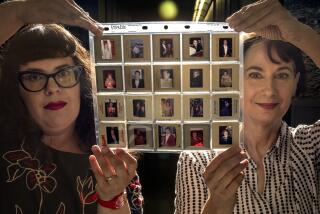New Home for Bukowski
- Share via
It is an unlikely literary marriage: Charles Bukowski, the chronicler of a hard-drinking, womanizing, bar-brawling life in L.A.’s underbelly, with the Huntington Library, the genteel San Marino repository of Chaucer and Dickens.
But that’s the match that Bukowski’s widow made Wednesday with her announced donation to the Huntington of his literary archive, a very large and valuable cache of books, manuscripts and fan letters replete with photos of less-than-fully-dressed females.
“It’s going to be scandalous. This would tickle my husband. It would crack him up,” Linda Lee Bukowski said from her San Pedro home, where curators have been sorting through more than a thousand items. Those include a typed draft of his 1982 novel “Ham on Rye,” with handwritten corrections; his screenplay for the 1987 autobiographical movie “Barfly;” rare poetry journals from the 1940s; and scratch forms for horse races at Santa Anita.
Huntington officials are thrilled to have all that material and more, some of it peppered with sex, violence and alcohol abuse, from the poet and novelist who emerged late in life from L.A.’s underground to become an internationally renowned author and an iconic cultural figure. Bukowski died of leukemia at age 73 in 1994.
“Bukowski pushes the envelope a little for us. And I love that,” said Sue Hodson, the Huntington’s curator of literary manuscripts, who stressed that the library is shedding its former reputation as a “very formal and somewhat stodgy place.”
She said acquiring the Bukowski archive makes sense at the Huntington because “we collect the very best in American and British literature,” including such other 20th century authors as Christopher Isherwood and Jack London.
At points during his life, Bukowski sold off some papers and letters to libraries such as UC Santa Barbara and the University of Arizona, his longtime editor, John Martin, founder of the Black Sparrow Press, said Wednesday from his Santa Rosa office. But the Huntington’s new acquisition is the most important of any Bukowski collection and helps confirm his reputation as “the 20th century Walt Whitman,” Martin said.
Experts expressed astonishment and gratitude to Linda Lee Bukowski, who they estimated could have sold the collection for more than $1 million. Hodson described it as “enormously valuable,” but she and Bukowski declined to speculate on its specific worth because no full appraisal has been done.
At a March auction in San Francisco, an autographed first edition of Bukowski’s 1960 poetry collection “Flower, Fist and Bestial Wail” sold for $9,775, the highest price of the day and more than for works by Jack Kerouac and Allen Ginsberg.
Although other institutions pursued the collection, Bukowski said she initiated talks with the Huntington because she is a frequent and enthusiastic visitor there. “Some people look at me like I’m nuts for not selling,” she said. But donating instead, she said, “has given me a great deal of joy.”
Born in Germany to a German mother and an American soldier father, Henry Charles Bukowski (his wife still refers to him as “Hank”) moved to the United States as a toddler and had a tough childhood in Baltimore and in the Los Angeles area. His face was scarred with boils, and he was badly bullied in school. He turned to drinking as a teenager, and his early hardscrabble life and romantic misadventures informed much of his early writings.
Starting in the mid-’60s, his partnership with Martin’s Black Sparrow Press allowed him to write full time and brought him increasing acclaim. His published works of fiction, poetry and short story collections include “Post Office,” “Septuagenarian Stew,” “Notes of a Dirty Old Man,” “Women” and “Factotum,” which has been made into a film starring Matt Dillon and is scheduled for an August release.
One of the oldest items donated is a 1946 edition of a mimeographed literary journal called “Matrix,” signed by Bukowski and containing both a short story and a poem of his, Hodson said. The poem, “Soft and Fat Like Summer Roses,” begins: “Rex was a two-fisted man, Who drank like a fish, And looked like a purple gargoyle.”
S. A. Griffin, a Bukowski collector and expert in Los Angeles, said the Huntington is a perfect home for a writer who is sometimes stereotyped only for his drinking and brawling.
“I think it legitimizes his work and the impact of his work on people around the world,” Griffin said. And, he added, “it’s just down the road from Santa Anita.”
More to Read
Sign up for our Book Club newsletter
Get the latest news, events and more from the Los Angeles Times Book Club, and help us get L.A. reading and talking.
You may occasionally receive promotional content from the Los Angeles Times.










